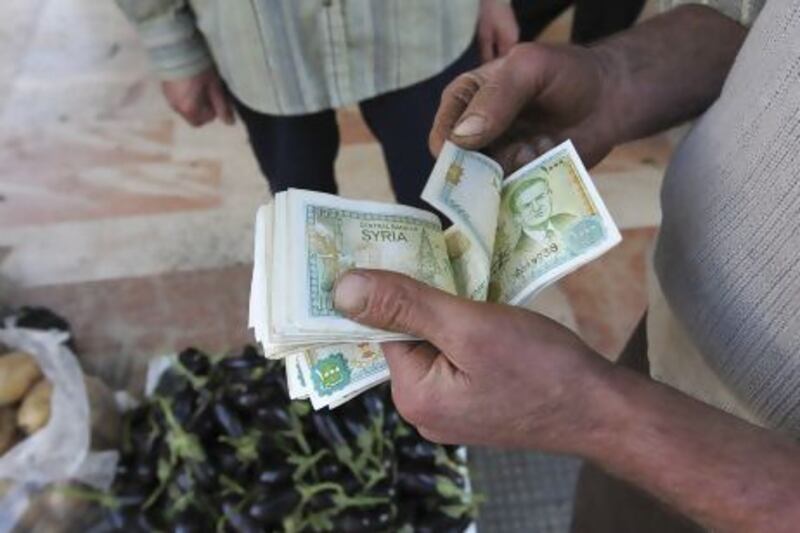The main suspect wanted in connection with a brazen daylight robbery of more than US$10 million (Dh36.7m) from one of Syria's biggest private banks has been held for questioning in Egypt, a senior bank official said.
In January, $3.4m in cash, €4.75m (Dh22.8m) and 33m Syrian pounds (Dh1.7m) was allegedly stolen from the vault of the International Bank for Trade and Finance (IBTF) in Damascus.
The bank's chief executive, Sultan Al Zobi, in an interview with The National at the time, said he believed the robbery was an inside job.
The bank learnt that the suspect fled Damascus to Egypt immediately after allegedly committing the crime, Mr Al Zobi said this week.
The suspect was arrested last month, upon the discovery by Cairo authorities that his passport was fraudulent, Mr Al Zobi added.
The bank has hired a lawyer to expedite the extradition of the suspect from Egypt, he said.
"The suspect has been arrested by Egyptian authorities and is currently held by Interpol," said Othman Othman, a lawyer at DLA Matouq Bassiony, the Cairo-based affiliate of international law firm DLA Piper.
"The only authority that can decide in such a case to extradite him back to Syria is the general prosecution in Egypt," said Mr Othman, who is acting on behalf of IBTF.
IBTF, whose major shareholder is Jordan's Housing Bank for Trade and Finance, in January alerted the Jordanian and Syrian authorities, as well as Interpol, about the suspect after security cameras at the bank had recorded the robbery.
Syria has experienced a surge in crime and chaos since the start of an uprising against Bashar Al Assad's regime more than two years ago.
The Syria International Islamic Bank, the largest shareholder of which is the Qatar Islamic Bank, in September said it had been targeted in a robbery resulting in the loss of 75.2m Syrian pounds.
Banque Bemo Saudi Fransi, backed by Saudi Arabia's fourth- biggest lender by market capitalisation, in the same month said it had incurred losses from fraud and forgery totalling 25m pounds in a separate filing. In January, Banque Bemo said 7.3m pounds and $182,198 went missing when the lender moved deposits from the restive Deir Al Zor to its headquarters in Damascus.
Through the fog of war it is becoming increasingly difficult for observers to identify which are opportunistic heists or which may be the work of the regime - or its opponents.
"There is circumstantial evidence that points towards the regime for facilitating those robberies - with hard currency leaving the country - as it loses its grip in the country. What the media calls the Shabiha [regime-sponsored enforcers, may be involved]. There has been tacit approval from senior members of the regime for these types of activities in lieu of salaries," said Yaser Dajani, associate managing director and the Dubai office head at risk consultancy Kroll.
"Most of the banks' headquarters are located in neighbourhoods that are very close to the presidential palace. There is a security ring around Damascus. A robber would have to go through a web of checkpoints, with not just one network, but multiple networks of checkpoints," he said.
The day of the robbery - Thursday, January 17 - began like any other morning at work, according to Mr Al Zobi.
In what seemed like a typical transaction, the suspect notified security guards that two customers had arrived to withdraw money from the bank's vaults, he said.
"[The suspect] made it clear to them that they were customers and we need to deliver them cash," Mr Al Zobi said. "There's a Levant proverb, which is loosely translated as 'you can't keep a watch on a thief that is part of your household'," said Mr Al Zobi.
The alleged theft was discovered on Sunday, the first working day after the weekend.
"When the bankers came to count the cash inventory in the main vault, bank notes were found to be missing," Mr Al Zobi said. "We looked at the cameras, which shows the suspect helping the men to put the cash in the boxes.
"The camera also views the bank's main street, Pakistan Street. We saw the money being placed in the trunk of a car with the suspect standing outside. It was an operation that was very transparent and easily dismissed as a normal everyday transaction."
The suspect fled Damascus the same day the alleged crime was discovered and travelled to Turkey. However, the fake passport the suspect was carrying contained an expired visa and authorities refused entry, putting the suspect on a plane to Egypt, the destination of origin mentioned in the suspect's papers.
"They didn't realise the passport was forged," Mr Al Zobi said. "They sent [the suspect] back to Cairo."
Upon arrival in Egypt, authorities discovered the suspect's passport was not an original, and that he had swapped photos.
"After brief interrogation ...[they learnt the suspect's] real name and ... the entire story," Mr Al Zobi said.
The suspect will be moved to Jordan for further questioning, because half of the bank's capital is from Jordanian shareholders and then extradited to Syria, Mr Al Zobi said.
"The bank is a Syrian bank and... [the suspect is] a Syrian national. The stolen money is Syrian money."





